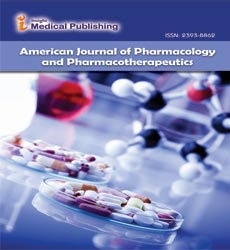ISSN : 2393-8862
American Journal of Pharmacology and Pharmacotherapeutics
Potential Targets and Processes of Pharmacology
Jingjing Zhang*
Department of Biological Sciences, Pontifical Catholic University, Rio de Janeiro, Brazil
- *Corresponding Author:
- Jingjing Zhang
Department of Biological Sciences,
Pontifical Catholic University, Rio de Janeiro,
Brazil,
E-mail: Zhang_j@gmail.com
Received date: November 18, 2023, Manuscript No. IPAPP-24-18655; Editor assigned date: November 21, 2023, PreQC No. IPAPP-24-18655 (PQ); Reviewed date: December 04, 2023, QC No. IPAPP-24-18655; Revised date: December 11, 2023, Manuscript No. IPAPP-24-18655 (R); Published date: December 18, 2023, DOI: 10.36648/2393-8862.10.4.172
Citation: Zhang J (2023) Potential Targets and Processes of Pharmacology. Am J Pharmacol Pharmacother Vol. 10 No. 4: 172.
Description
Pharmacology, as a discipline at the crossroads of biology and medicine, is dedicated to unraveling the intricate interactions between drugs and living organisms. Its primary goal is to decipher the mechanisms by which drugs exert their effects, laying the foundation for the development of novel therapeutic interventions and the optimization of existing treatments. In this article, we embark on a journey through the expansive realm of pharmacology, focusing on the diverse targets and complex processes that form the backbone of this scientific discipline. The landscape of pharmacology is characterized by its continual pursuit of answers to fundamental questions about how drugs interact with the body at molecular, cellular, and systemic levels. The study of potential targets involves the identification of specific molecules within the body that can be modulated to achieve therapeutic outcomes. Simultaneously, the exploration of pharmacological processes encompasses the dynamic interplay between drugs and the biological systems they interact with, unraveling the intricacies of drug absorption, distribution, metabolism, and excretion. The canvas of pharmacology is painted with the diversity of drug targets, ranging from receptors on cell surfaces to nuclear factors influencing gene expression. Receptors, in particular, serve as key protagonists in the pharmacological narrative, responding to signaling molecules and providing a gateway to manipulate cellular responses. Enzymes, ion channels, and transporters further contribute to the cast of potential targets, each playing a unique role in the orchestra of physiological processes.
Nuclear Receptors
Nuclear receptors are transcription factors that regulate gene expression. Targeting these receptors can modulate the synthesis of proteins involved in various physiological processes. Nuclear receptors represent a fascinating and crucial category of targets in pharmacology, playing a pivotal role in regulating gene expression and orchestrating various physiological processes within the cell. These receptors are a class of transcription factors that exert their influence on the genome by modulating the transcription of specific genes. This ability to directly impact the production of proteins makes nuclear receptors attractive targets for pharmacological interventions. Here, we delve deeper into the intricacies of nuclear receptors and their significance in drug development. The activity of nuclear receptors is often modulated by ligands, which can be endogenous hormones or synthetic drugs. Binding of a ligand induces conformational changes in the receptor, leading to its activation or repression of gene transcription. This liganddependent activation makes nuclear receptors highly responsive to changes in cellular and environmental conditions. The modulation of nuclear receptors has profound therapeutic implications. Drugs targeting these receptors can be designed to either mimic or antagonize endogenous ligands, thereby finetuning the expression of specific genes. For instance, agonists of peroxisome proliferator-activated receptors are used to treat conditions like type 2 diabetes by regulating lipid metabolism. Despite their therapeutic potential, targeting nuclear receptors comes with challenges, including the potential for off-target effects and the risk of disrupting intricate physiological balances. However, advancements in structural biology and our understanding of receptor dynamics are paving the way for more precise and selective drug design.
Precision Pharmacology
Advancements in pharmacology are increasingly moving towards precision medicine, tailoring treatments based on individual genetic makeup and other patient-specific factors. Precision pharmacology, also known as personalized or precision medicine, represents a paradigm shift in healthcare, moving away from a one-size-fits-all approach to a more tailored and individualized model. This emerging field leverages advancements in genomics, molecular biology, and data analytics to customize medical treatments based on an individual's unique genetic makeup, lifestyle, and environmental factors. Here, we delve into the key aspects and implications of precision pharmacology. Precision pharmacology relies on the identification of biomarkers—biological indicators that can predict a patient's response to a particular treatment. Biomarkers may include genetic markers, protein levels, or other molecular signatures that inform treatment decisions. The primary goal of precision pharmacology is to customize treatment plans based on the unique characteristics of each patient. This involves selecting drugs that are more likely to be effective and avoiding those that may be less beneficial or potentially harmful, considering the patient's genetic and molecular profile.
Open Access Journals
- Aquaculture & Veterinary Science
- Chemistry & Chemical Sciences
- Clinical Sciences
- Engineering
- General Science
- Genetics & Molecular Biology
- Health Care & Nursing
- Immunology & Microbiology
- Materials Science
- Mathematics & Physics
- Medical Sciences
- Neurology & Psychiatry
- Oncology & Cancer Science
- Pharmaceutical Sciences
